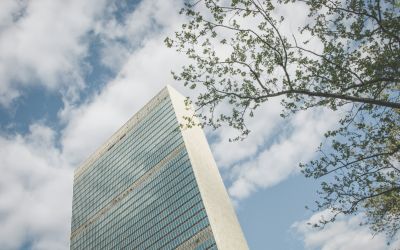Countdown to COP29 – NDCs 3.0 and the path to 1.5°C
Overcoming the NDC implementation gap will be critical for the next round of submissions, due in February 2025. COP29 is a key opportunity to raise ambition for these plans whilst addressing implementation and financing needs to ensure practicability.
_1000_1000.png)
Yesterday (14 October), Pre-COP discussions concluded following a week of intense climate diplomacy, which brought together ministers, heads of delegations, negotiators, and constituencies from around the world and featured two Heads of Delegation meetings, a High-Level Ministerial Dialogue, and the Pre-COP conference.
In less than a month's time, these key figureheads will be joined by representatives from the private sector and the global climate community in Baku in the fight to get back on track for 1.5°C. On 13-15 November, the Climate Action Innovation Zone will welcome leaders from across the climate sphere, convening the innovation ecosystem to drive transformative climate action and support countries in meeting their national climate plans, presented in the form of Nationally Determined Contributions (NDCs).
NDCs are at the heart of the Paris Agreement, the legally binding international treaty on climate change adopted at COP21. They outline and communicate countries’ post-2020 climate actions and are to be submitted every five years to the UNFCCC secretariat. The next round, known as NDCs 3.0 are required by February 2025, and are to be informed by the outcome of the first Global Stocktake (GST), which concluded Dubai last year at COP28. The GST found that whilst progress has been made towards the Paris Agreement’s goals, these efforts are insufficient to meet the long-term goals set out.
Current NDCs are estimated to reduce global emissions by around 8% by 2030 from 2019 levels, far off the 43% needed according to the Intergovernmental Panel on Climate Change (IPCC). They account for around 49% of global emissions, however there is a clear implementation gap, which significantly hinders their efficacy.
NDCs 3.0 may be the last opportunity to put the world on track with a 1.5°C trajectory. They need to be progressive and more ambitious than current NDCs. This is reiterated by the European Council, who approved yesterday (14 October) conclusions that will serve as the EU’s general negotiating position for COP29, including the need for NDCs 3.0 to reflect progression and the highest possible level of ambition and include economy-wide and absolute reduction targets that cover all greenhouse gases.
As such, COP29 is an opportunity for Parties to discuss how to effectively develop and raise commitment levels for these national plans. The targets set out through the NDCs by national governments have implications for actors in the real economy and cannot be achieved without them. Therefore, including sector specific plans and targets in the updated NDCs will be vital for attracting investment and setting direction for those involved across global value chains in order to close the implementation gap.
Delivering on NDCs and climate commitments will require building partnerships for collaborative innovation, a key thread that will run throughout the Sustainable Innovation Forum, a flagship event of the Climate Action Innovation Zone. The Forum will open by exploring the impact and opportunities for non-Party entities brought about by the negotiations, including on the forthcoming NDCs. Together, we can forge a path towards a sustainable future that leverages the power of collective action and innovation.
Find out more about the Innovation Zone here. To register, please visit https://events.climateaction.org/innovation-zone/registration/




_400_250_s_c1.png)

